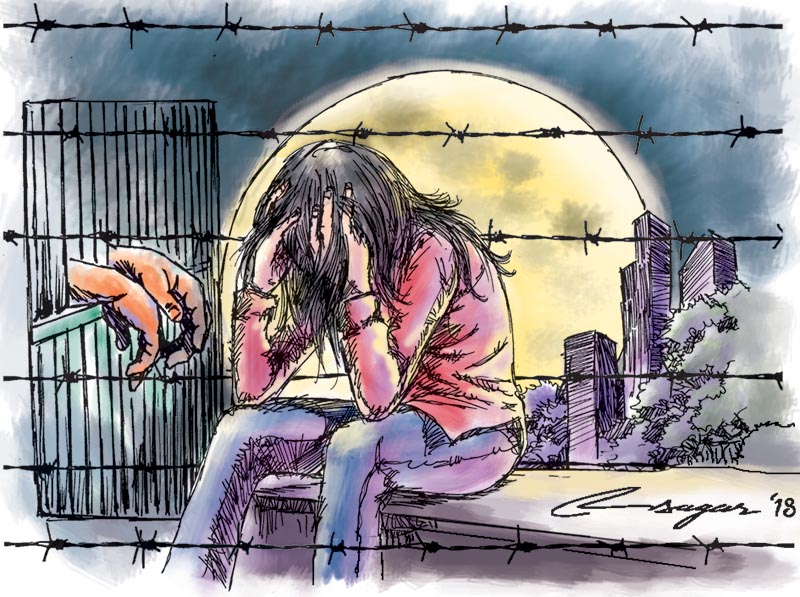Change the mindset
Rape victims need legal, social, economic and psychological support. Concerted efforts are a must to combat rape crime; and if this happens to someone, the society must not further victimise the rape victim
There is no perfect definition of rape in law. The Akayesu case of Rwanda sheds some light on this subject. The International Criminal Tribunal for Rwanda (ICTR) in the Akayesu case in 1998 held that “rape is a form of aggression” and that “the central elements of the crime of rape cannot be captured in a mechanical description of objects and body parts”. It defined rape as “a physical invasion of a sexual nature, committed on a person under circumstances which are coercive”.
International Criminal Tribunal for former Yugoslavia and the ICTR explicitly classify the physical rape as crime against humanity. International laws have mentioned criteria for the offence to be rape. It is rape if force or threat of force is used, if other vulnerable situations are created where party is unable to refuse and if sex is done with minor even with a consent.
Nonetheless, these definitions fall short of addressing the social stigmas the rape victims face. There have been various researches, and criteria for an offence to be rape have been further explained, but none of these explanations set the criteria for the offence committed by society by further victimising the rape victims.
Rape is a crime against humanity but the way society elaborates it, compelling the victim to go to depression or even commit suicide is more inhuman. Laws have been made to control rape crimes but they have not been able to address social, economic and psychological problems faced by rape victims in society after the case is solved in the court of law.
So first we need to understand why society victimises rape victims. It will be wrong to brand every individual as a criminal because the society further victimises rape victims, but in general rape victims face immense challenges when it comes to leading a dignified life after the incident.
The society has a tendency to label women’s sexually as what is called “honour”. That is why Kautilya said a woman should always be under the protection of a man.
In his Chanakya Niti, he says, “Women should never be free. So long she is unmarried, she has to remain under the protection of the father or elder brother; after her marriage, she is to remain under the guardianship of her husband; and when she becomes a widow she is to be under the control of her son.”
She is persuaded to protect her hymen as if it is the only thing determining her purity, and her knowledge, ability and purity of heart are considered as secondary requirements. Rituals like using clean white bed sheets on the wedding night and a secret ceremony next morning to present it in front of the groom’s family are still practised in some communities.
And there have been reports how at times families try to keep the incident of rape secret for the fear of stigma. Researches have shown family members’ involvement in such crimes. So hiding the crime leads to injustice to the victims.
Reports of rape incidents just to humiliate the entire community the girl belongs to are even more disturbing. Rape has been also used as a tool to take revenge with the men from the community. The ICTR in the Akayesu case and Musema case held that rape and sexual violence could constitute genocide when the specific conditions of genocide were fulfilled.
Then there is a wrong notion of hyper-masculinity where a “real man” is defined as his ability “to take women by force”. Sexual urge of men are almost acceptable in our society. The society regards what a woman wears as an instigating agent for rape and tries to control over what she wears, where she goes and the surroundings she lives in. These are archaic notions and must change.
Many rape cases are solved in villages by marrying off the girl to the perpetrator with the consent of her parents, as they fear that no one will marry her as her “purity has been lost”.
These all are the deepest roots of rape crime.
Today level of awareness has increased among people. This is slowly making an impact on sexual attitude of people. Today, an educated person might not take hymen as the symbol of a girl’s purity. A boy might agree to marry raped girl and a girl might not take chastity as her pride. But in a society everyone does not have this kind of mindset.
People influenced by old notions and having conservative attitudes regarding sexuality imprinted in their mind still exist. Thus, it is high time every individual started delinking women’s sexuality from the notion of honour and redefined the concept of real man. If this is done then only will victimisation of rape victim by society come to an end.
Rape victims need legal, social, economic and psychological support. Concerted efforts are a must to combat rape crime; and if this happens to someone, the victim should not be further victimised. Since such crimes are often committed in private, with only the victims as the sole witness, prosecution becomes even more challenging. The society should help restore confidence in rape victims so such incidents come to an end.
Everyone has the right to live a life with dignity. The society must help uphold this right. The tendency to look women as inferior, pliable and even disposable must end.
Further victimisation of rape victims can end only if we change our mindset.
Laxmi is a student of law






